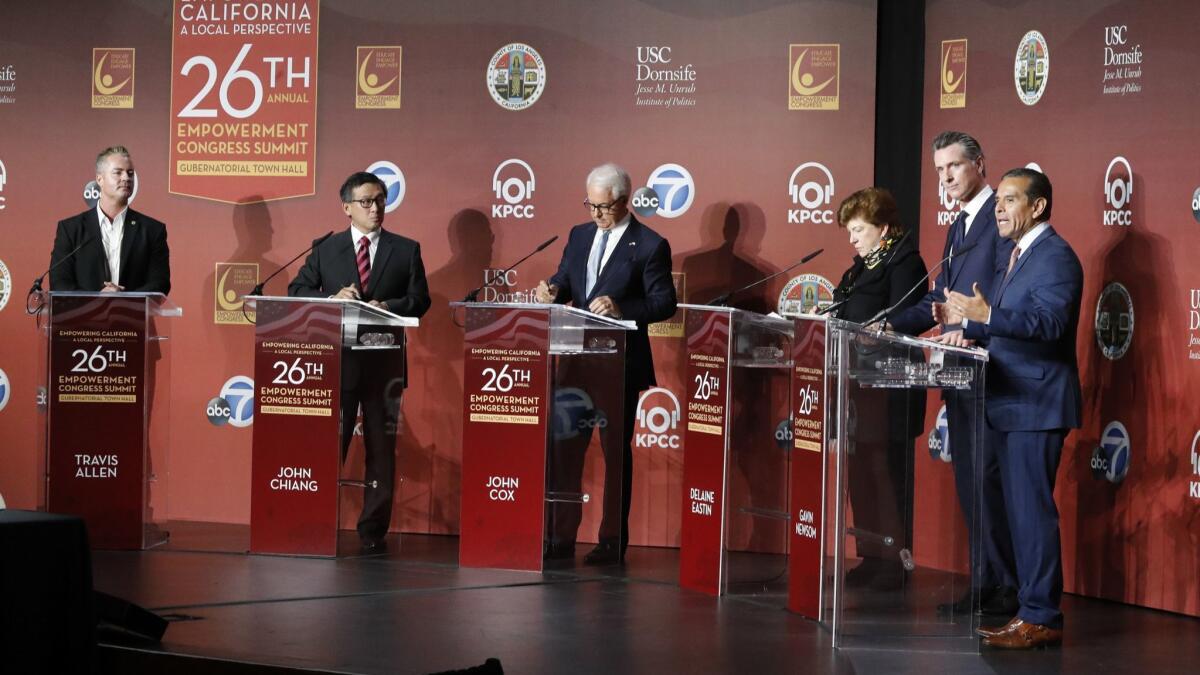Gavin Newsom leads fundraising in the California governor’s race, but Antonio Villaraigosa gets a boost from allies

Lt. Gov. Gavin Newsom continues to rule fundraising in the governor’s race, with more than $17.6 million in the bank, according to fundraising documents filed with the state. But wealthy allies of fellow Democrat Antonio Villaraigosa dumped more than $12.5 million into an independent effort to boost his candidacy — just before mail ballots are sent to voters.
The money, which was contributed by a handful of donors over the course of a week, is funding a barrage of television advertisements promoting Villaraigosa’s record at a time he needs to change the narrative of the race. Recent polling has shown him scrambling for second place, which he needs to capture in the June primary to move onto the general election.
But “Villaraigosa has a very, very powerful weapon,” Bill Whalen, a fellow at Stanford’s Hoover Institution, said of the large infusion of cash to the former mayor of Los Angeles.
A poll released last week by the UC Berkeley Institute of Governmental Studies showed Republican candidates John Cox and Assemblyman Travis Allen of Huntington Beach ahead of Villaraigosa by at least 7 percentage points. Whalen still believes Villaraigosa has an edge because of money.
“The more things change in California, the more they stay the same,” said Whalen, who worked as a speechwriter for Republican Gov. Pete Wilson. “It comes down to the final push in the month before the primary — and the power of television.”
Villaraigosa has raised $2.4 million this year and reported having $7.1 million in the bank with $101,011 in debt. But the pro-Villaraigosa independent expenditure committee — which can take unlimited donations — funded by charter-school backers had $7.3 million in its bank account as of April 21, according to reports filed with the state on Thursday. It has continued to pick up six- and seven-figure checks since then.
The biggest contributors to that effort include Netflix chief Reed Hastings, Los Angeles billionaire and philanthropist Eli Broad and former New York Mayor Michael Bloomberg.
Follow California politics by signing up for our email newsletter »
Newsom continues to lead in the polls and fundraising. He reported raising $4.6 million this year, leading to a total haul of $24.9 million since he began running in early 2015. He reported $59,325 in debt.
He also has $2.9 million in a lieutenant governor campaign account that can be transferred to his gubernatorial campaign. An independent expenditure group formed by the California Nurses Assn. backing Newsom’s bid also has $1 million in the bank.
State Treasurer John Chiang is the other Democrat in the race with substantial resources going into the primary. He has $7.9 million cash on hand, but his donations slowed this year — while he reported raising nearly $4.4 million, $3.1 million of that was a transfer from his treasurer’s campaign account. Chiang reported $28,864 in debt.
An independent expenditure committee supporting Chiang’s bid formed by the United Nurses Assn. of California/Union of Health Care Professionals raised $250,000 this year.
But Chiang has not shown any movement in the polls, typically placing in the single digits. Nor has former state schools chief Delaine Eastin, who reported $140,701 in the bank and $101,370 in debt.
Among Republicans, Cox, a wealthy Rancho Santa Fe businessman, leads with $1.2 million in the bank. He has donated $4 million to his campaign, and has been scrapping with Villaraigosa for second place in recent polling.
Allen, his top GOP rival, has $147,609 in the bank and $28,120 in debt. But he has support among grass-roots conservative voters, and has been scooping up local party endorsements up and down the state.
Coverage of California politics »
They are both trying to create momentum by aligning themselves with a gas-tax repeal initiative on the November ballot, and by opposing California’s “sanctuary state” law, a movement sweeping conservative parts of the state.
Next weekend, the California Republican Party will decide whether to endorse in the race. If either candidate wins the party’s nod, that could help him consolidate the state’s GOP voters, increasing the chances of placing second in the June primary.
“One of them has to convince Republicans that they are the ‘real Republican,’ ” said veteran Democratic political strategist Darry Sragow, publisher of the nonpartisan California Target Book.
He added that while money is necessary to campaign in a state as large as California, it is not determinative. He pointed to 2010 GOP nominee Meg Whitman, who spent $178.5 million on her unsuccessful gubernatorial campaign, including $144 million of her own money.
Given Californians are not “intimately familiar” with any of the candidates in the race — even Newsom — the campaigns need to be both efficient and disciplined when reaching out to undecided voters and when crafting a core political message that will resonate, he said.
“Having gobs of money and throwing it at the wall doesn’t mean success,” Sragow said.
For the latest on national and California politics, follow @LATSeema and @philwillon on Twitter.
More to Read
Get the L.A. Times Politics newsletter
Deeply reported insights into legislation, politics and policy from Sacramento, Washington and beyond. In your inbox three times per week.
You may occasionally receive promotional content from the Los Angeles Times.












